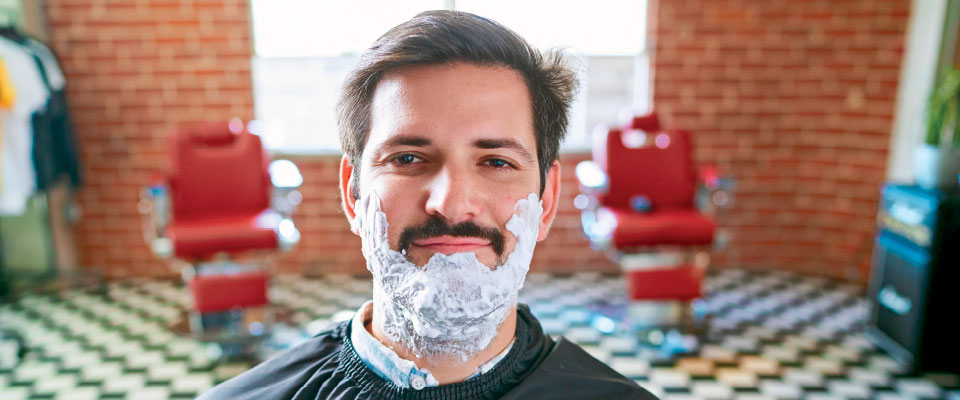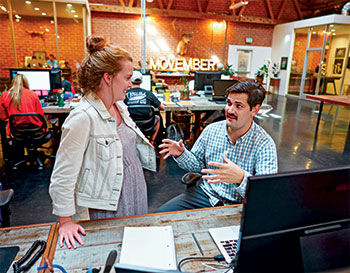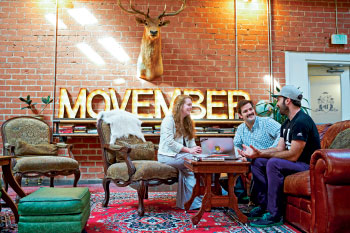Beyond Lip Service

by Bill Landauer
if you’re going to work for a charity that calls on men to grow mustaches in November as a way to raise awareness about men’s health issues, there are two must-haves: an epic stache and a gift for gab.
Doug Prusoff ’12, college engagement manager for Movember, favors the Trucker, an upside-down U that ends beneath the edges of his lips. Check that box.
His conversation skills prove equally impressive.
During lunch at a Mexican restaurant near his Los Angeles office a few months ago, the ex-lacrosse player jaws about sports and sociology before launching into a story about the time he lost his lunch running up a hill near his office.
The talk is the variety of bar stools and golf courses: warm, unhurried, and unrehearsed. Clearly a Bro Banter pro. Second box checked.
Then suddenly a more serious topic emerges from beneath the Trucker.
“One in seven guys is going to be diagnosed with prostate cancer,” Prusoff says between bites of salad. “Testicular cancer is the most common form of cancer for men ages 15 to 35.”
That’s his job, Prusoff says—saving lives by breaking down the John Wayne barrier. Many men in the U.S. are still raised to believe in the axiom of the Western hero stereotype: Don’t whine about your aches or pains. But silence doesn’t equal strength, Prusoff says, and, in fact, it’s a big reason why women live five to 10 years longer. Men often wait until it’s too late.
“Every single guy has his own story of why he does it,” Prusoff says, pointing to his Trucker, which, even in today’s age of the hipster beard, is incongruous with his gingham button-down and khakis. “Some of our stronger participants definitely have a more personal connection, family connection. What the mustache means to them, what getting the conversation going means to them. I could probably rattle off about 500 stories.”

Charlotte Herzan ’12 (left) visited her college pal Doug Prusoff ’12 a couple years ago and liked the life he was leading. She applied for a job at Movember, landed it, and now the two are neighbors.
He just heard one this morning. “I had a phone call, and the guy’s talking and I asked, ‘How’d you get involved in Movember?’ He’s like, ‘I got involved in Movember because my grandfather died of prostate cancer.’ He was kind of that ultimate manly man, rub dirt in it, don’t talk to the doctor about anything.”
The story about Prusoff’s mustache doesn’t come quite as easily. It’s about a horrifying day when as a junior in high school at his home in Connecticut, Prusoff found his older brother wielding a razor, not to put an end to a budding stache, but his life. Prusoff doesn’t like to talk about it.
But with the job he now holds, he has to.
MO BRO
The Movember Foundation’s Los Angeles headquarters mixes old-fashioned maleness with new-world business.
For the past two years, the office has operated a barbershop. A couple local barbers offer trims on Thursdays and Fridays. They’ve been trained in such light dinner conversation as the dreaded rubber-glove prostate check and self-checking for bumps in areas the sun shouldn’t reach.
The barbershop doubles as a bar, where locals can stop in on certain days to watch Movember’s male staffers (yes, there are women who work there, and no, most of them don’t have discernible facial hair) part their lip shrubbery to hoist a few cold ones.
Both the bar and the barbers are “a way to get people in and get the conversation going,” Prusoff says.
At the rear of the building, the offices open up to resemble what they once were—a mammoth dance studio operated by Debbie Allen of the 1980s movie Fame. On one wall, a map details the 21 countries where Movember has an operation. It started in 2003 in Melbourne, Australia, when two guys—Travis Garone and Luke Slattery—decided over beers to grow mustaches. Today, the charity funds 1,000 programs, and there are 5 million volunteers, known as Mo Bros and Mo Sistas.
Prusoff isn’t the only Lafayette alum. A couple years ago, a buddy and classmate, Charlotte Herzan ’12, came out to visit and Prusoff recommended she apply. Today, they’re next-door neighbors, and she works in Movember’s partnerships department, drumming up business among corporations.
It’s a yawning, open floor plan, so the two work in relative close proximity when Prusoff is in town. He spends a lot of time on the road. As the college engagement manager, Prusoff used to fly to schools all over the country, although his role is evolving. He meets with fraternities and clubs, chats with legions of guys over beers and wings about growing mustaches, raising funds and… well, ball-handling skills. If you know what he means.
“So with the mustache, it’s the ultimate conversation starter. And at any point you could have a conversation that could change someone’s life.”
– Doug Prusoff ’12
The illnesses might be serious, the stories of when they reach someone might be inspiring (and frequent), but Movember doesn’t treat men’s health awareness like a funeral. In fact, the humor isn’t lost on anyone.
On his desk, Prusoff keeps a framed snapshot of a hairy, mustachioed Mo Bro, naked, save pile after pile of bakery-quality doughnuts stacked on his chest.
It is a recreation of a Kanye West Instagram shot, in which the performer covered himself in pastries in a bathtub. The fundraiser said he’d recreate the photo for donations.
“Sometimes you get creative and have some fun with it,” Prusoff says. “It doesn’t have to be elaborate. You hop in a bathtub, throw some doughnuts on, and there’s your fundraiser.”
Prusoff first visited the offices in 2012, shortly after graduating. He’d been a Movember star for years.
A Mo on the Grow

Movember’s sprawling offices in Culver City, Calif., were once a dance studio operated by Debbie Allen of the 1980s movie Fame. They feature a barbershop and places for people to talk about men’s health issues.
A hit to the skull brought Prusoff to Lafayette.
The summer before his senior year in high school, not long after that very bad day involving his brother, Prusoff took a hit at a lacrosse camp that broke his jaw. It kept him out of playing that summer, which, since he went to a small private school, would have been the only time he’d have been scouted by major Division I programs.
So Prusoff attempted to turn his lacrosse skills to smaller programs and eventually found his way to Lafayette.
“Once I ended up there, it was exactly what I wanted,” he says. “Great academics, great social life, these are people that I will be friends with for the rest of my life.”
His degree in American studies, the sociological and anthropological examination of the culture, allowed him to chart his own course and has been invaluable at Movember, Prusoff says. Not only does it give him fodder for conversation, it provides him with the tools he needs for understanding who he’s talking to.
Following what interests him has served him well. While his classmates worried over careers, Prusoff didn’t sweat it.
“I figured I’ll be at a bar somewhere, grabbing a drink with a guy and … yeah, something’ll work out,” he says.
In the end, he decided to follow his nose—or, as it turns out, the patch of hair underneath it.
Big Mo
Men’s Biggest Health Issues
Prostate Cancer
- 1 in 7 men will be diagnosed with prostate cancer in their lifetime.
- 1 American dies from prostate cancer every 19 minutes.
- In 2015, an estimated 220,800 American men were diagnosed with prostate cancer.
Testicular Cancer
- Testicular cancer is the most common cancer in young men ages 15-35.
- About 8,720 new cases of testicular cancer are diagnosed in men each year.
- About 380 men will die of testicular cancer this year.
Mental Health and Suicide Prevention
- Around 1 in 4 adults in the U.S. will experience a mental health problem in a given year.
- The highest rate of depression is in men ages 40-59.
- On average 87 men each day take their life by suicide in the U.S.
During his sophomore year, some of the upper classmen were growing mustaches for Movember. Prusoff thought it would be fun, so he joined in. In those days, the seriousness of what it stood for didn’t mean much to him. That came later.
After the upper classmen moved on, Prusoff continued working to raise funds. He manned a table in Farinon, asking his classmates to donate or join in. He hit up his family for donations.
A Movember public relations firm arranged for him to do a TV spot at a Hartford, Conn., Fox affiliate. Donations poured in.
At the end of the year, Prusoff learned he was the top Movember fundraiser in the nation. He had brought in $5,200 and won the “Big Mo on Campus” prize.
“It’s not like I did anything super outlandish at that point in my fundraising career,” he says. “Just reaching out to a lot of family and friends, told them why I was doing it, what the fundraiser was all about, and was fortunate enough to get some really cool support.”
The achievement came with a prize. A company called Contiki Tours took him on a West Coast bus tour with 50 other people after he graduated. It started in Los Angeles, went through San Diego, the Grand Canyon, Yosemite, and eventually ended in San Francisco.
In Los Angeles, Prusoff dropped by the Movember headquarters, professed his love for the organization, and asked about full-time jobs. At the end of that summer, Movember reached out with a limited-time job offer working for the campaign.
Prusoff worked at the job that fall and then, in January, while embarking on a five-month backpacking tour through Australia, Indonesia, and Vietnam, he got a message that the university engagement job was available. Prusoff did an interview via Skype and landed the gig in a subsequent interview after he flew home.
As he gets older, he’s moving away from visiting college campuses, focusing on a beat that covers Dallas, Austin, and Boston and working with corporate and community participants. Movember is also evolving. These days, mental health and giving voice to problems like depression and post-traumatic stress disorder—a subject near to Prusoff’s heart—have entered the conversation.
“I love the foundation,” he says. “I love what I do. I don’t want to go anywhere else.”
Every day, inspiring stories strike him. Once, a guy in Colorado who’d sported a mustache for 40 years joined. His wife and kids had never seen him without his upper lip bristles. He agreed to shave the stache on Nov. 1 and regrow it for a month. When he shaved, he found a hard lump on his upper lip. Cancer, the doctors told him. Within a week, doctors removed it, saving his life. They never would have caught it if he hadn’t shaved.
“So it’s just kind of little things like that,” Prusoff says. “Without Movember, without talking about it, you just wouldn’t have that difference.”
Great Bro
And then there’s his own story, the reason Prusoff wears a stache.
It goes like this.
Prusoff, a lacrosse-playing high school junior, is sitting in his room in Fairfield, Conn., instant messaging buddies on his computer.
His older brother calls to him from his room. “Come here a minute,” he says.
Prusoff’s older brother had come home recently from University of Miami. He’d had trouble with drugs and alcohol. Doctors had diagnosed him with bipolar disorder.
Prusoff finds him standing in his room. He’s holding a razor blade. He says he’s been lying in the bathtub with the blade. He says he’s thinking of taking his own life.
“Give me a reason why I shouldn’t,” Prusoff’s brother says. “And so, very much put on the spot, I just talked about how much we loved him,” Prusoff says, his warm baritone falling into staccato phrases. “My family. Everyone around him. How great things were ahead of him. And that this was just a difficult time. It’s going to get better, you just need to hang in there.”
Eventually, Prusoff’s brother thanks him. “I feel a lot better,” he says. Prusoff immediately goes to his mother for help.
Life didn’t get better right away. But the conversation marked a turning point for Prusoff’s brother.
“And right now he lives in Florida, and he’s been sober for eight years now, he has two kids, he’s extremely happy,” Prusoff says. “Because of one conversation. So with the mustache, it’s the ultimate conversation starter. And at any point you could have a conversation that could change someone’s life. So that’s mine. And I don’t share it with everyone. This stuff isn’t very easy to talk about. But it needs to be.”
THE STORY of MO
 Two guys walked into a bar.
Two guys walked into a bar.
It was 2003, and it was the Gypsy Bar in Fitzroy, Australia. Travis Garone and Luke Slattery, two guys from Melbourne, hoisted beers and talk got around to fashion.
What happened to the mustache, they wondered. You used to see it on faces everywhere, but by the turn of the century, it was as though follicles had evaporated from upper lips. like the polar ice caps. They joked about bringing it back.
The two men decided to link their mustache-growing idea to a fundraising campaign for men’s health and prostate cancer.
They developed a logo, sent out an email, and found 30 guys who wanted to participate.
It grew. By 2004, the group had raised more than $40,000 for the Prostate Cancer Foundation of Australia. The first Movember check was the largest single donation the charity had ever received.
By 2014, Movember had raised nearly $650 million worldwide. There have been 4,746,905 Mo Bros and Mo Sistas since 2003.
Here’s how it works: You sign up with Movember. You shave.
For the month of November, you let your upper lip do what nature intended.
Your face is your billboard for men’s health.